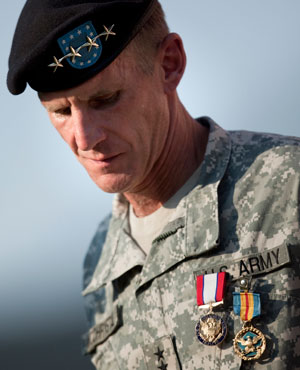
General Stanley McChrystal: Trying to Shake Off A Bad Interview
There are countless examples of what Wired Magazine terms the “indiscreet subject.” That’s a reference to people who say more then they should in media interviews. In the summer of 2010, four-star General Stanley McChrystal was relieved of his command in Afghanistan after he and his staff vented their frustrations to journalist Michael Hastings, on assignment for Rolling Stone magazine.
The article, headlined, “The Runaway General,” was so sensational it put the White House in near-crisis mode for forty-eight hours. Quote after quote was a scathing put-down of the non-military leaders, including the vice president and the president’s national security advisor. The fact that civilian oversight of the military is what allows democracies to endure was apparently lost on the career soldiers as they drank and joked with an embedded note taker.
In his upcoming memoir, My Share of the Task, McChrystal gives this explanation for his poor judgement call: “By nature I tended to trust people and was typically open and transparent, …But such transparency would go astray when others saw us out of context or when I gave trust to those few who were unworthy of it.” His media trainer should have told him, if you don’t say it, it can’t be taken out of context.
McChrystal still needs time to reflect on how a thirty-four-year career buckled under the weight of a few words, beginning with the notion that training trumps “nature” in interviews and warfare.
Posted by Bodine Williams

Makes you wonder how much contempt he had for the administration considering he was so careless in the presence of a reporter.
Bodine: Guess the lesson is once it out of your mouth, you said it. Still I don’t recall him doing much in the way of damage control. Handing in his resignation(which was accepted by the President) was the best he could do. Wonder how much arrogance played a part as I agree with what Reggie said. I enjoy your comments on crisis situations that are self made.
Toni
As a big fan of transparency; and of insightful training that works to make that transparency endearing….
What I find interesting – in a democracy, and in a culture founded in the Enlightenment and the exposure of truth – is the push/pull between being trained to be discreet and being coached to conceal an internally repressed agenda.
In McChrystal’s case, I feel that democracy was best-served by the exposure of the latter.
“You meet your enemy on the narrow bridge.” (Thai proverb)
In politics and public discourse, it is better, for all concerned, when truth creates this bridge.
Hi David,
I will remember, to meet my enemy on a narrow bridge. How apt. Trust my best email correspondant ever to be profound. I’d like to marry your mind. B
My lawyer in Toronto gave me some profound advice: “Never volinter any information”. I guess it’s kind of hard when you’re the top dog and some nice chap is asking you seemingly nice question.
Chief Client Strategist
Finally, a media-training guide that addresses character and conduct as well as techniques.
READ MORE BUY NOW
“I wanted to forge a connection between character and interviewing. The 19 rules of conduct anticipate the self-destructive impulses of otherwise smart, accomplished people who blunder when facing questions.” - Bodine Williams
How not to mess up a media interview
“Each story produces lots of advice for lesser souls contemplating public comments…[making] them pungent and well worth reading in themselves."
- Harvey Schachter, Columnist See